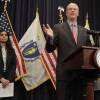COVID -19 is a great leveler. In a narrow but profound way, it imposed a life and death challenge on all American cities. But as a glimmer of hope cracks the horizon, it's time to begin looking forward and reengage with problems overshadowed by coronavirus. Here's a look at my view on three of the big problems Boston will face when the pandemic lifts. And they are big problems — all sobering illustration of the magnitude of the challenges the next mayor will face. That's what this year's municipal election will be about: Boston's post-pandemic future.
1. The Boston Public Schools: The schools are in worse shape than most people realize — and have been for a good ten years. BPS used to be among the nation's strongest urban districts. But one year before the pandemic, the Massachusetts Department of Elementary and Secondary Education found that "improvement in student academic outcomes [has] been largely stalled." Translation: While some schools are great and some are good, taken as whole, the system stinks. The sad summary is that students of color are not well served. Almost 60% of Boston's students are poor, and about 4,000 are homeless for some part of the year. That's an incredible task to confront. That said, an average of just 22% of Black and economically disadvantaged students meet or exceeded expectations, as measured by the Massachusetts Comprehensive Assessment System. On the other hand, 73% of Asian students and 62% of White students meet or exceed expectations.
2. Affordable Housing: Last September, in the middle of the pandemic, GBH News commissioned a poll and found that, coronavirus aside, the issue that most worried Bostonians was affordable housing. While not everyone has kids, everyone needs a place to live. So the affordable housing button is very hot. The pandemic has cooled the rental market. But with the passage of President Joe Biden's $1.9 trillion recovery bill, we can expect the economy to heat up again. Any modest relief to sheltering costs will prove a passing illusion. Affordable housing attracts a lot of grandstanding. Since the Reagan administration began to cut aid to cities, urban America has found itself more or less on its own. That means the marketplace is more influential than any city hall can be. (I'm just describing the situation — please don't kill the messenger.) Without getting bogged down in debating the adequacy or inadequacy of Boston's efforts to date, I would argue that the only answer is that we must do more and we must do better. Last month, City Hall began a move to increase linkage fees for big construction projects like office buildings and laboratories, with the proceeds going to affordable housing. The hike would be 42%, which would mean developers would pay the city $15.86 for each square foot. It's another step in the right direction. The question is, a year from now, will the market be more steps ahead?
3. Police Reform: It's very much a work in progress, an outline that needs to be filled in. If we step outside the COVID construct I'm exploring here, you can glimpse how tricky — or delicate — implementation will be. Consider these facts: Police Commissioner William Gross retires unexpectedly. Mayor Marty Walsh appoints Dennis White, the top cop who sat on the mayor's reform panel, to fill the seat. News comes that allegations of domestic abuse were filled against White years ago. Walsh put things on hold and appoints an outside law firm to investigate. City Hall won't release relevant documents, despite a finding from state transparency officials that it should either release them or explain why secrecy must be maintained. All of this is just a snap shot, but it shows just how cloudy the issue of reforming the police will be.






